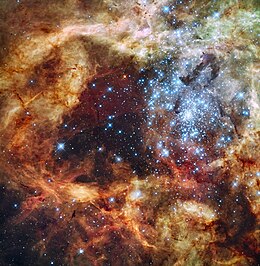멜닉 42
Melnick 42| 관찰 데이터 Epoch J2000 Equinox J2000 | |
|---|---|
| 콘스텔레이션 | 도라도 |
| 적경 | 05h 38m 42.12s[1] |
| 적위 | -69° 05°55.19°[1] |
| 겉보기 등급(V) | 12.78[1] |
| 특성. | |
| 스펙트럼형 | O2If*[2] |
| B-V 색지수 | +0.08[3] |
| 아스트로메트리 | |
| 반지름 속도(Rv) | 173[4] km/s |
| 거리 | 163,000년 (49,970[5]pc) |
| 절대 등급(MV) | - 7[3].4 |
| 세부 사항 | |
| 덩어리 | 189[3] M☉ |
| 반지름 | 21.1[6] R☉ |
| 광도 | 3,600,000[3] L☉ |
| 표면 중력(log g) | 3.90kg[7] |
| 온도 | 47,300[3] K |
| 회전 속도(v sin i) | 240[7] km/s |
| 나이 | 최대[8] 100만 년 |
| 기타 명칭 | |
MK42, Brey 77, BAT99 105, 2MASS J05384212-690552 | |
| 데이터베이스 참조 | |
| 심바디 | 데이터. |

RMC 136 클러스터Melnick 42는 맨 오른쪽 그림에서 주성단 바로 위에 있습니다.
멜닉 42는 도라도자리에 있는 대마젤란 성운의 타란툴라 성운에 있는 거대한 청색 초거성이다.크기는 태양의 21배에 불과하지만, 47,300 K의 고온으로 타란툴라 성운의 가장 밝은 별 중 하나로 3,600,000개입니다.LR136 클러스터 중앙에서 2파섹도 안 되지만 중심핵에서 멀리 떨어져 있습니다☉.
Mk 42는 발견 당시 스펙트럼형 WN으로 분류된 뒤 O3 If로 분류됐다.슬래시별이 정의될 때 스펙트럼 유형 O3* If/WN6이 지정되었다. 마지막으로 스펙트럼 등급 O2의 도입과 슬래시별 분류의 정교화로 인해 O2* If로 태그가 붙었다.비록 초거성 광도 등급이지만, 이것은 사실상 중심핵에서 수소를 태우는 주계열성이다.그것은 [8]백만 년도 안 된 것으로 생각된다.
레퍼런스
- ^ a b c Doran, E. I.; Crowther, P. A.; De Koter, A.; Evans, C. J.; McEvoy, C.; Walborn, N. R.; Bastian, N.; Bestenlehner, J. M.; Gräfener, G.; Herrero, A.; Köhler, K.; Maíz Apellániz, J.; Najarro, F.; Puls, J.; Sana, H.; Schneider, F. R. N.; Taylor, W. D.; Van Loon, J. Th.; Vink, J. S. (2013). "The VLT-FLAMES Tarantula Survey. XI. A census of the hot luminous stars and their feedback in 30 Doradus". Astronomy & Astrophysics. 558: A134. arXiv:1308.3412. Bibcode:2013A&A...558A.134D. doi:10.1051/0004-6361/201321824. S2CID 118510909.
- ^ Crowther, P. A.; Walborn, N. R. (2011). "Spectral classification of O2-3.5 If*/WN5-7 stars". Monthly Notices of the Royal Astronomical Society. 416 (2): 1311. arXiv:1105.4757. Bibcode:2011MNRAS.416.1311C. doi:10.1111/j.1365-2966.2011.19129.x. S2CID 118455138.
- ^ a b c d e Bestenlehner, J. M.; Gräfener, G.; Vink, J. S.; Najarro, F.; De Koter, A.; Sana, H.; Evans, C. J.; Crowther, P. A.; Hénault-Brunet, V.; Herrero, A.; Langer, N.; Schneider, F. R. N.; Simón-Díaz, S.; Taylor, W. D.; Walborn, N. R. (2014). "The VLT-FLAMES Tarantula Survey. XVII. Physical and wind properties of massive stars at the top of the main sequence". Astronomy & Astrophysics. 570: A38. arXiv:1407.1837. Bibcode:2014A&A...570A..38B. doi:10.1051/0004-6361/201423643. S2CID 118606369.
- ^ Schnurr, O.; Moffat, A. F. J.; St-Louis, N.; Morrell, N. I.; Guerrero, M. A. (2008). "A spectroscopic survey of WNL stars in the Large Magellanic Cloud: General properties and binary status". Monthly Notices of the Royal Astronomical Society. 389 (2): 806. arXiv:0806.2801. Bibcode:2008MNRAS.389..806S. doi:10.1111/j.1365-2966.2008.13584.x. S2CID 6590534.
- ^ Pietrzyński, G; D. Graczyk; W. Gieren; I. B. Thompson; B. Pilecki; A. Udalski; I. Soszyński; et al. (7 March 2013). "An eclipsing-binary distance to the Large Magellanic Cloud accurate to two per cent". Nature. 495 (7439): 76–79. arXiv:1303.2063. Bibcode:2013Natur.495...76P. doi:10.1038/nature11878. PMID 23467166. S2CID 4417699.
- ^ Hainich, R.; Rühling, U.; Todt, H.; Oskinova, L. M.; Liermann, A.; Gräfener, G.; Foellmi, C.; Schnurr, O.; Hamann, W. -R. (2014). "The Wolf-Rayet stars in the Large Magellanic Cloud: A comprehensive analysis of the WN class". Astronomy & Astrophysics. 565: A27. arXiv:1401.5474v1. Bibcode:2014A&A...565A..27H. doi:10.1051/0004-6361/201322696. S2CID 55123954.
- ^ a b Puls, J.; Kudritzki, R.-P.; Herrero, A.; Pauldrach, A. W. A.; Haser, S. M.; Lennon, D. J.; Gabler, R.; Voels, S. A.; Vilchez, J. M.; Wachter, S.; Feldmeier, A. (1996). "O-star mass-loss and wind momentum rates in the Galaxy and the Magellanic Clouds Observations and theoretical predictions". Astronomy and Astrophysics. 305: 171. Bibcode:1996A&A...305..171P.
- ^ a b Crowther, P. A.; Schnurr, O.; Hirschi, R.; Yusof, N.; Parker, R. J.; Goodwin, S. P.; Kassim, H. A. (2010). "The R136 star cluster hosts several stars whose individual masses greatly exceed the accepted 150 M⊙ stellar mass limit". Monthly Notices of the Royal Astronomical Society. 408 (2): 731. arXiv:1007.3284. Bibcode:2010MNRAS.408..731C. doi:10.1111/j.1365-2966.2010.17167.x. S2CID 53001712.



